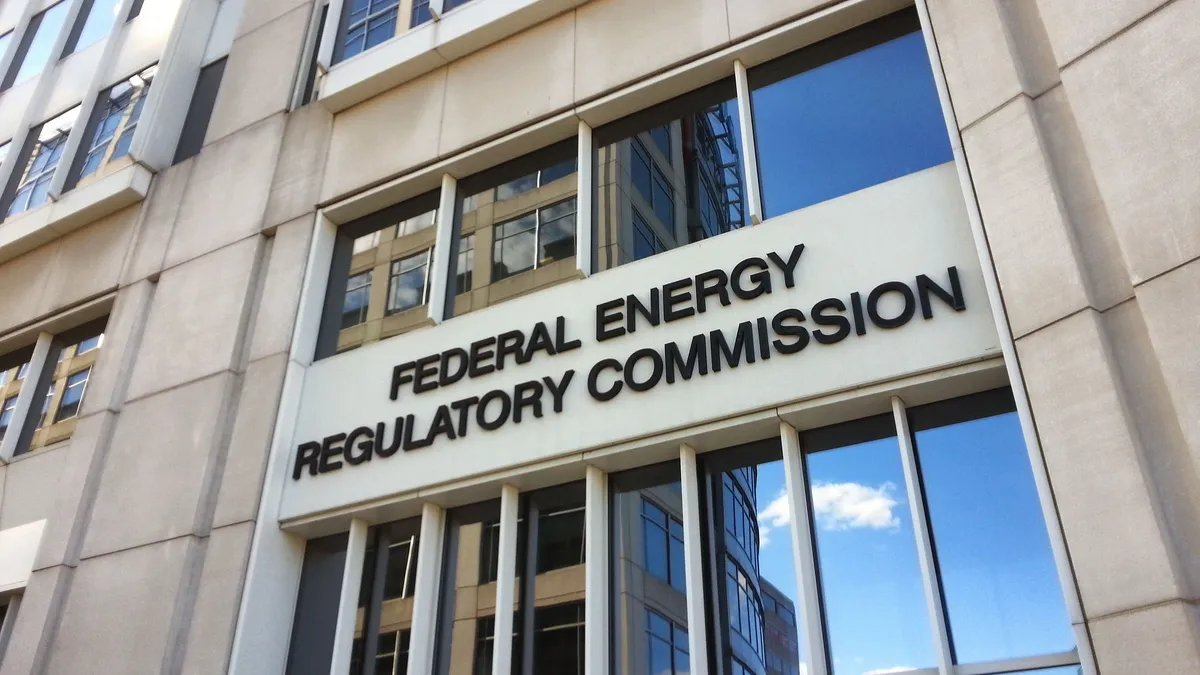Dive Brief:
- Supporters and opponents of the Department of Energy's baseload cost recovery proposal filed reply comments with the Federal Energy Regulatory Commission (FERC) this week, aiming to shape the next phase of what many expect will be a lengthy rulemaking process on plant compensation.
- Supporters of the DOE proposal argued that it or a similar cost recovery package is necessary to keep at-risk coal and nuclear plants from going offline and threatening power reliability. Opponents said DOE and its allies has shown little evidence that reliability is threatened, and pushed FERC to devise broader, market-based approaches to value grid resilience.
- The reply comments come after sitting FERC regulators indicated the commission could significantly alter the DOE cost recovery proposal. FERC is expected to act on the proposal by Dec. 11.
Dive Insight:
The smart money on the DOE's cost recovery proposal is that it likely won't be enacted as written.
Last month, Commissioner Cheryl LaFleur told Utility Dive the Notice of Proposed Rulemaking (NOPR) is likely not detailed enough to form a final rule, and Acting Chairman Neil Chatterjee has repeatedly said the regulators have a number of options for action on the proposal, including issuing changes, a new rule or rejecting the NOPR entirely.
With that in mind, many reply comments on both sides of the NOPR appeared eager to shape that potential next phase of rulemaking.
Coal mining company Murray Energy was among the most supportive of the DOE's proposal as written, arguing that calls to amend the proposal are simply to "'run out the clock”' while critical numbers of baseload coal and nuclear units are lost forever."
"If the Commission fails to act now, it is entirely plausible that by 2030 close to an additional 70,000 MW of coal and nuclear capacity may be retired," Murray wrote. "[G]iven the potential impacts and the finality of the loss of such resources over the very near term, FERC simply cannot wait, and must, at minimum, adopt the Proposed Rule’s proposed compensation mechanism on an interim basis," Murray wrote.
Murray's comments may hold special significance as the company's CEO was reportedly involved in preliminary White House discussions over saving coal plants. Another company with a seat at the table was Midwest generator FirstEnergy, which built on a proposal in its initial comments to expand the NOPR and implement it in wholesale power markets.
"Only FirstEnergy’s proposal lays out how the resilient units can be reasonably compensated within a market construct by using an approach substantively similar to how this Commission has accommodated similar policy choices in the past," the company argued. "[T]his issue is too important, too pressing, and too critical to the Nation’s security and grid reliability to leave to the never-ending vicissitudes of the so-called RTO/ISO stakeholder processes."
Nuclear backers argued for broader changes in the NOPR, but still couched their reforms in providing cost-of-service regulation, rather than more market-based mechanisms for resilience.
Exelon, the nation's largest nuclear generator, argued FERC should take immediate action to preserve its plants by directing wholesale market reforms at PJM be completed within 90 days. After that, FERC should collect data from RTOs and ISOs on system vulnerabilities and devise a "design-based threat (DBT)" that can inform further reform.
"A DBT will provide a benchmark against which resilience can be measured, and a basis for developing specific solutions for the RTOs to implement," Exelon argued. After that, the company said it supports a call from PJM for FERC "to direct each RTO to submit specific reforms to address any resilience-related issues identified in an RTO, with a 'deadline that is in the near term.'"
Those comments contrasted opponents of the NOPR, which ranged from independent natural gas generators to renewable energy developers and environmentalists. Normally, noted the Electric Power Supply Alliance, a generator trade group, these parties "cannot agree on the time of day," but they stand united against the cost recovery proposal.
"[I]t speaks volumes to the flaws in the proposed rule and the benefits of competitive markets that they were united in their opposition to the proposed rule," EPSA wrote.
Alongside EPSA, a broad coalition of energy groups, including the American Petroleum Institute and clean energy trade group Advanced Energy Economy, filed joint comments arguing that DOE and its allies have not provided sufficient evidence to support providing cost recovery to coal and nuclear generators.
"Of the hundreds of comments filed in response to the DOE NOPR, only a handful purported to provide substantive evidence in support of the proposal," the joint industry filing argues. "In contrast, an overwhelming majority of initial comments agree that the DOE NOPR fails to substantiate its assertions of an immediate reliability or resiliency need related to the retirement of merchant coal-fired and nuclear generation."
In a separate filing, AEE urged the commission to make any future examination of grid resilience "fuel neutral," defining attributes that could be met by a variety of power technologies, and not just baseload generators.
How the commission will view the hundreds of comments remains an open question. LaFleur and Commissioner Robert Powelson have indicated they want significant changes to the NOPR, and Chatterjee often says that he wants to find a way to increase compensation to coal and nuclear plants that does not "blow up the market."
Just last week, the Senate confirmed two new FERC commissioners — energy lawyer Kevin McIntyre and Senate staffer Richard Glick. During their confirmation hearings, which took place before the NOPR was issued, the new regulators did not address cost recovery questions directly, but pledged to keep the commission independent and fuel-neutral.
“The importance of [baseload] resources cannot be denied,” said McIntyre, who will become FERC Chairman when he is sworn in. “However, FERC is not an entity whose role includes choosing fuels for the generation of electricity. FERC’s role rather is to ensure that the markets for the electricity generated by those facilities proceed in accordance with law.”














